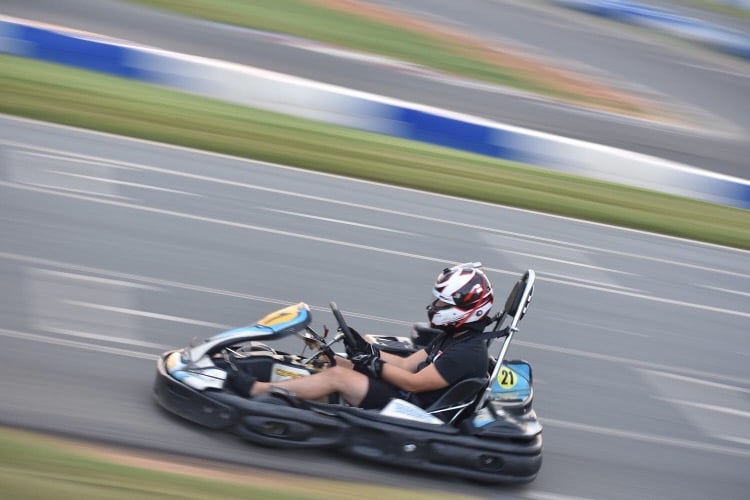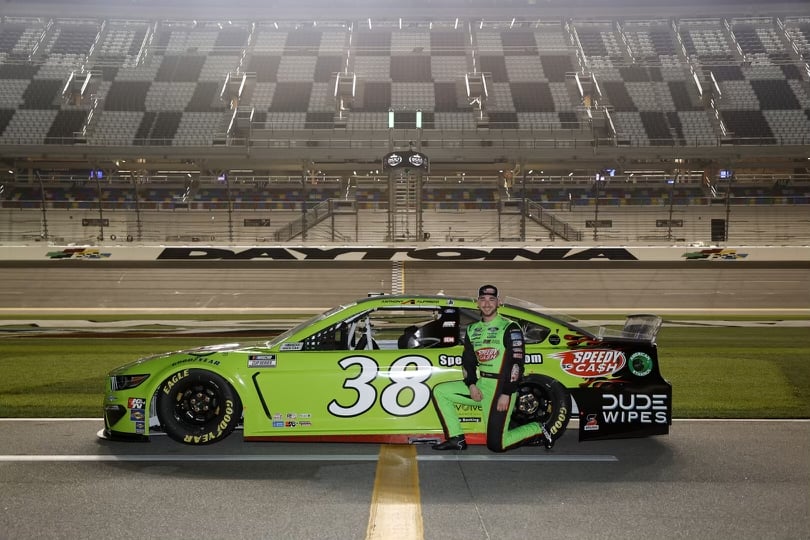Anthony Alfredo’s journey
Generally speaking, when did your journey that brought you to NASCAR begin?
I grew up a racing fan. My parents were going to races and were race fans long before I was even born! When I grew up, it was a weekly thing to watch the races on the weekend.
I used to go to the Go Kart track when I was younger. [It was] just for fun, but I ended up being really good at it, enjoying it and kind of getting competitive. I don’t want to say it wasn’t real racing, but it was a rental Go Kart track where you pay like $45 and you get three races. So that’s how I started, they supply the equipment, and obviously the cars.

It wasn’t until I was 15—which is actually really late because a lot of guys race their whole lives […] because that experience is just so critical—but when I was 15, man, I was racing those rental cars. I was really good at it. I got into what’s called a Legend Car, which is a three-scale model of an old ‘34 Coupe, and that’s kind of how I learned some of the basics.
It was at that time that I discovered iRacing. Not only was it a great way to learn new tracks I might race at because they have three dimensional scans of all these places, but it actually allowed me to really hone my skills.
[After that] I got into a late model stock car, which is kind of the first stock car series you race in. I competed regionally, won a championship my first year, won a couple of races, and then the next year I actually had the opportunity to drive for Dale Earnhardt Jr. who was my childhood hero growing up, so that was a pretty surreal experience.
Honestly, from there, I just kind of climbed the ranks one year at a time all the way to the NASCAR Cup Series. It’s pretty surreal because I grew up a fan. I think I have a different perspective than most just because I don’t have any relation to anybody in this sport. I’ve just been learning as I go and meeting all these amazing people, having the opportunity to do what I love.

How big of a role would you say sim racing really played in getting you to where you are today?
It’s played a huge role. I honestly don’t believe I’d be where I am without it just because of the lack of experience I had starting my career […] I was way behind the eight ball. iRacing really helped me learn a lot of the basics, get ahead of the curve and catch up to come of my competitors, so to speak.
Honestly, even now it’s still critical, mainly because the last two years as a rookie in the NASCAR Xfinity Series and the NASCAR Cup Series—NASCAR’s highest level of premiere series—we did not have practice or qualifying [because of COVID]. I was a rookie, so to not have any track time before taking the green flag for these races is pretty stressful and obviously a huge challenge that no rookie in history has every had to face except for me and maybe one or two others.
The entire season, 30 some-odd races, I did not have practice or qualifying, and I haven’t been to a lot of these tracks. Even the ones I had been to, I’ve never been in a Cup Car—it’s so different that it basically felt like a new track anyways. It was a big challenge to overcome, but that’s why iRacing was so important to me! D-BOX [also] comes into play [because] the subtle cues and the haptic system allowed me to actually pick up on where bumps are in the track or certain scenes and stuff like that. Because iRacing scans all the tracks, every bump is exactly how it is in real life!
[Sim racing] has been a huge benefit to me and allowed me to get more comfortable before the race starts. It really is the next best thing to actually being able to drive it in real life.
Anthony’s take on NASCAR racing overall
Do you think there’s some form of inherited ability that you have to have or some sort of skill you have to be born with, or can someone teach themselves to be successful?
If you just so happen to be born with some natural talent or raw ability, you’re going to be ahead of somebody who might not have that same skill. But, I’m a firm believer that if a person who maybe wasn’t born with as much natural ability puts the time in, they can be as good—if not better—than the other person. I truly believe that if you put your mind to something and put the time in, you can figure it out! The best in the world are those people who put in more time than anybody else.
In my case, I started late, and I just put in the time to catch up. I’ve been able to accomplish that and that’s something I’m proud of. But, at the same time, I definitely worked for it. It didn’t just come overnight. It’s taken years of learning, whether it was things I did well and needed to repeat or mistakes I’ve made and that I had to improve upon. You just have to keep your head down and keep working every step of the way because you can always be better.
What do you think the future holds when it comes to sim racing’s importance for professional driving? Do you think it’s something that more and more drivers are going to adopt?
Yeah, I think so. I mean, nowadays, most of the real-life drivers are on iRacing, whether it’s just for fun or more recently, really to practice and use it as a legitimate training tool. That’s huge for the sim, but honestly, I kind of like to look at it from the esports industry in general away from racing and say, ‘how do we make this mainstream just like Call of Duty or Fortnite? That’s what I want to see, because I know how realistic and valuable it is.
At the same time, even the non-real-life racer me just thinks it’s so cool and so unique. I would love to see it just continue to grow, which it [already] has tremendously. If I’m not mistaken, the Pro Invitational Series aired on Fox during the initial lockdown, which is huge for the industry. It was the most watched [event in all of] esports just because of the reach they had.
Last week I also competed in the first ever live iRacing event in person, where we had simulators on stage. I’ve always wanted that to happen, so I think we’re taking the next steps to really see it compete with some of those bigger, more mainstream games out there.
How can equipment like D-BOX’s haptic actuators really take your skills to the next level?
Well, I think for me personally, it's made me a better sim racer because I have more feel, but it's also made me a better real-life race car driver. It's made me more competitive on the sim but what it's also done is allow me to feel more and really turn it into a legitimate training tool.
With the D-BOX haptic system and my Sim Seats driving simulator, the ergonomics are just about exactly how I sit in my real-life race car, so it feels natural when I get in there. And I think that's the biggest thing. But for me, because it feels like real life, the more I can get out of it, the more I could work on honing my skills. D-BOX has really allowed me to do this.
Keep an eye out for part 2
Now that you know how Anthony went from race fan to professional driver, keep your eyes peeled for part 2 of our interview in which he lays out how to leverage iRacing as a training tool and gives some advice for all the aspiring racers and sim racers out there!
